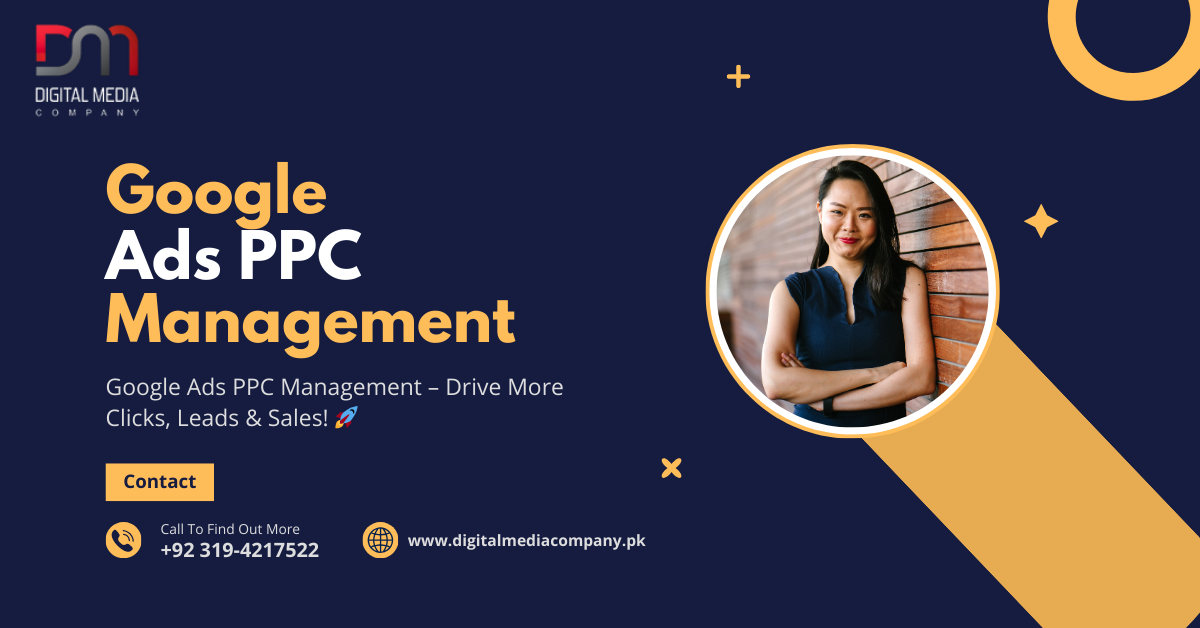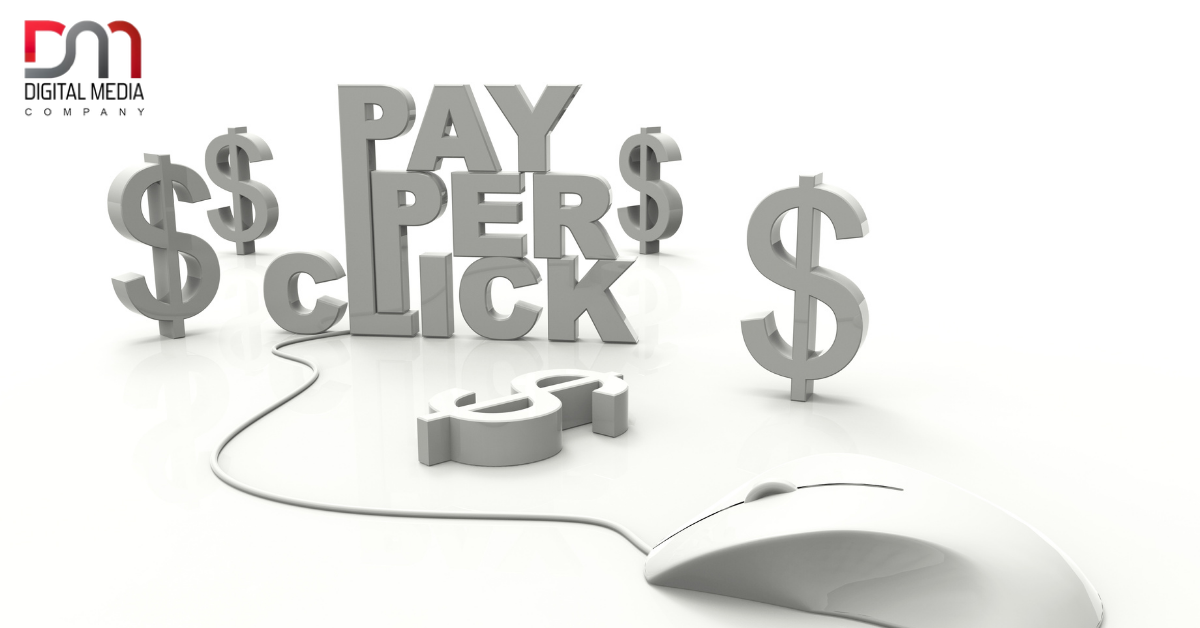In today’s fast-paced digital world, businesses need smart advertising strategies to stay ahead. Google Ads PPC Management is one of the most effective ways to drive targeted traffic, generate high-quality leads, and boost sales. However, running a successful PPC campaign requires expertise, strategy, and continuous optimization. This is where Digital Media Company (DMC) comes in!
If you’re looking to maximize your ROI, reduce ad spend, and improve conversions, DMC’s Google Ads PPC Management services can help. Our team of experts ensures your business gains more visibility, higher click-through rates, and increased revenue. Contact DMC today and take the first step toward scaling your business online!

What is Google Ads PPC Management?
Google Ads PPC Management is the process of creating, optimizing, and monitoring paid search campaigns on Google. It involves targeting the right audience, selecting high-intent keywords, and managing bids to achieve the best possible return on investment (ROI).
A well-managed PPC campaign ensures that businesses appear in front of potential customers when they search for relevant products or services. Without proper management, businesses can waste thousands of dollars on ineffective ads. This is why expert PPC management is crucial for success.
How Google Ads Works: The Basics
Google Ads operates on an auction-based system. Advertisers bid on keywords, and Google decides ad placements based on bid amount, ad quality, and relevance. When users search for those keywords, the highest-ranked ads appear at the top of search results.
Each time a user clicks on an ad, the advertiser pays a fee. This is called pay-per-click (PPC). The goal is to optimize ad campaigns so that businesses pay less per click while maximizing conversions. Proper targeting and strategy are key to making PPC campaigns profitable.

The Importance of PPC Campaign Management
Without proper PPC management, businesses risk wasting money on irrelevant clicks, low-performing ads, and unoptimized landing pages. Effective campaign management ensures that every dollar spent contributes to achieving business goals.
A dedicated PPC manager continuously analyzes performance, adjusts bidding strategies, and improves ad copies. This results in better ad placements, higher engagement rates, and increased conversions. Investing in PPC management is essential for long-term success.
Key Benefits of Google Ads PPC
Google Ads PPC offers numerous advantages for businesses looking to grow their online presence. Some of the key benefits include:
- Instant Visibility: Unlike SEO, which takes months to show results, PPC ads appear instantly.
- Targeted Advertising: Businesses can target customers based on location, interests, and behavior.
- Cost-Effective: You only pay for actual clicks, ensuring better budget control.
- Measurable Results: Google Ads provides detailed insights into ad performance, allowing businesses to refine their strategies.
By leveraging these benefits, companies can achieve higher ROI and increased brand recognition.
Setting Up a Google Ads Campaign: A Step-by-Step Guide
Setting up a successful Google Ads campaign requires a structured approach. Follow these steps to ensure optimal performance:
- Define Campaign Goals: Decide whether you want more traffic, leads, or sales.
- Choose the Right Campaign Type: Options include Search, Display, Shopping, and Video Ads.
- Conduct Keyword Research: Find high-performing keywords relevant to your business.
- Write Engaging Ad Copy: Create compelling headlines and descriptions.
- Set Bids and Budget: Determine your maximum CPC (Cost Per Click).
- Optimize Landing Pages: Ensure pages are designed for conversions.
- Monitor and Optimize: Regularly analyze performance and make adjustments.
Each of these steps is crucial for running a profitable PPC campaign.

Keyword Research: The Backbone of PPC Success
Keyword research is one of the most critical aspects of PPC advertising. Choosing the right keywords ensures that your ads appear in front of the right audience.
There are different types of keywords to consider:
- Short-tail keywords: Broad, high-competition keywords (e.g., “digital marketing”).
- Long-tail keywords: More specific and lower-competition (e.g., “affordable digital marketing services for small businesses”).
By using tools like Google Keyword Planner, businesses can find profitable keywords that drive quality traffic.
Crafting High-Converting Ad Copies
A well-written ad copy can make the difference between a click and a missed opportunity. Effective ad copies should be:
- Clear and concise: Avoid jargon and keep the message simple.
- Benefit-driven: Highlight how your product or service solves a problem.
- Action-oriented: Use strong CTAs (Call-to-Actions) like “Get a Free Quote” or “Shop Now.”
Regular A/B testing helps in determining which ad copies perform best and should be scaled.
Optimizing Landing Pages for Better Conversions
A good PPC campaign doesn’t end with a click. The landing page must be optimized for conversions. Here’s how:
- Fast Load Speed: Slow pages lead to higher bounce rates.
- Clear CTAs: Make it easy for visitors to take action.
- Mobile Optimization: Ensure pages look great on all devices.
A well-optimized landing page ensures a higher ROI on PPC campaigns.

Bid Strategies and Budget Management
Managing bids effectively helps in getting the most value from your ad spend. There are different bidding strategies:
- Manual CPC: Full control over individual keyword bids.
- Maximize Conversions: Google adjusts bids to get the highest possible conversions.
- Target ROAS: Focuses on achieving a specific return on ad spend.
Choosing the right strategy depends on your business goals and budget.
A/B Testing for PPC Success
A/B testing helps improve ad performance by testing different elements, including:
- Headlines and descriptions
- Landing page layouts
- CTA placements
Testing and optimizing ensures continuous campaign improvement.
Tracking Performance and Analytics in Google Ads
Tracking performance is crucial for PPC success. Google Ads provides tools like:
- Google Analytics: Tracks website visitor behavior.
- Conversion Tracking: Measures leads, sales, and calls.
- Quality Score Analysis: Determines ad relevance and cost-effectiveness.
Regular performance tracking helps businesses refine their strategies for better results.

FAQs
How much does Google Ads PPC cost?
Costs vary based on industry, competition, and bid strategy.
How long does it take to see results?
PPC results are immediate, but optimizing for best ROI takes time.
What is a good PPC conversion rate?
A 2-5% conversion rate is considered good, but it depends on the industry.
Can I run PPC ads without a website?
Yes, but having a landing page improves conversions.
Is PPC better than SEO?
PPC provides instant results, while SEO is a long-term strategy.
Conclusion
Google Ads PPC is a powerful tool for businesses looking to generate more leads and sales. However, running a profitable campaign requires expert management and continuous optimization.
With Digital Media Company (DMC) by your side, you can maximize your ROI and dominate search results. Contact DMC today and let’s take your business to the next level! 🚀
